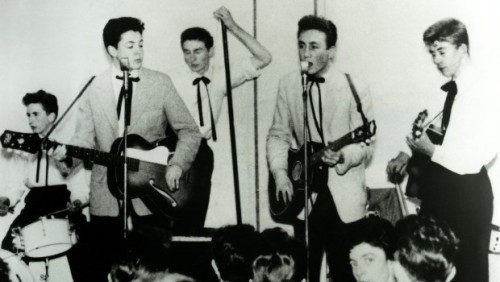 That’s a photo of a very young McCartney and Lennon, not yet the most important musicians in modern history. It’s a picture of promise, holding out the happy hope that from small things, big things one day come.
That’s a photo of a very young McCartney and Lennon, not yet the most important musicians in modern history. It’s a picture of promise, holding out the happy hope that from small things, big things one day come.
The 121212 Concert marathon was remarkable in ways related and peripheral to the core cause of Sandy relief. None of these collateral issues—not Kanye West’s leather skirt, not out of control ticket scalpers finding insane concertgoers—compares to the epiphany that rock is not, as it turns out, forever. At least not on stage.
Jethro Tull, at one time Grammy award winners for “Best Heavy Metal Album” (you can look it up), sang: “When you’re too old to rock and roll, but you’re too young to die.”
Chris Martin of Coldplay performed a sweet acoustic set, including a rare appearance by R.E.M.’s Michael Stipe. But Martin’s most interesting non-musical moments were his remarks about the age of performers. First he joked about his being their instead of One Direction because the late hour was past their bedtime. But then he turned to the other end of the life cycle, suggesting that viewers donate in the amount of the age of the performers, which would raise billions.
Rock has always been about three things: how you perform musically, how you perform non-musically (dancing, stage presence), and how you look. Here, with unreserved love for the recorded music and live performances of those mentioned, are some observations about the ”veteran” rockers.
The Rolling Stones are on their 50th anniversary tour. The music sounds pretty good. Charlie Watts, the most stoic drummer ever—maybe the most stoic rock musician ever—just sits there, an older version of his younger self. Keith Richards no longer looks like junkie and instead looks like a grandmother. Mick…is scary. His singing is not what it was, but it isn’t frightening either. But he is skeletal, his face drawn, his hair of questionable ownership, and his moves jerkily frenetic enough to raise fears of his falling down. Listening is still enjoyable, but you may seriously consider closing your eyes.
The Who were better musically than the Stones. They are on tour performing the entire Quadrophenia album live, and their set included instrumentally near-perfect renditions of those songs. Pete Townsend’s guitar windmills were a little slower and less emphatic than they used to be, but we know he can still play. It has been decades, and still no one will ever replace Keith Moon (tied with John Bonham as the all-time greatest drummer). The Who did what Queen and others have done with deceased essential bandmates: showed a video performance integrated into the live show. There was the video of Moon doing his distinctive vocals from Bell Boy, microphone in one hand, sticks working in the other, and at the end, Roger Daltry saluting him from the stage. Roger Daltrey. He can’t get all the notes, but it’s still an inimitable voice. The singing, it turned out, was not the problem. For reasons still (or never) to be fathomed, Daltrey believed that billions in the audience wanted to see his chest—including the stitch-scars from heart surgery—and so he obliged by keeping his shirt open for a couple of hours. It was actually just a few songs, but it seemed much longer.
Billy Joel redeemed the old guys. He has always written great songs suited to his vocal strengths and limitations, and both his playing and singing were so enjoyable and so not embarrassing.
Which brings us back to where we began, with the cute half of Liverpool’s very young Quarrymen. Paul McCartney has had a good number of big public performances in the past months. He dropped in on Bruce Springsteen in Hyde Park. He closed the Olympics. Some of what we heard was just okay, but unlike everybody else in the 121212 Concert, just okay would have been forgiven and enough because…it’s Paul. As it turns out, no apologies are needed. His own set was fun and memorable. But his fronting the one-time-only reunited Nirvana was a big moment. Kurt Cobain was a Beatles fan, and there is no doubt his unique introduction of hooky, clever melody into hard and dark rock and punk was done under their influence. At the end of the one song, Nirvana’s locomotive Dave Grohl looked down from his drum kit at McCartney, beaming, maybe amazed to be there, maybe thinking how much Cobain would have loved this.




 Panama
Panama Belgium
Belgium Brazil
Brazil




